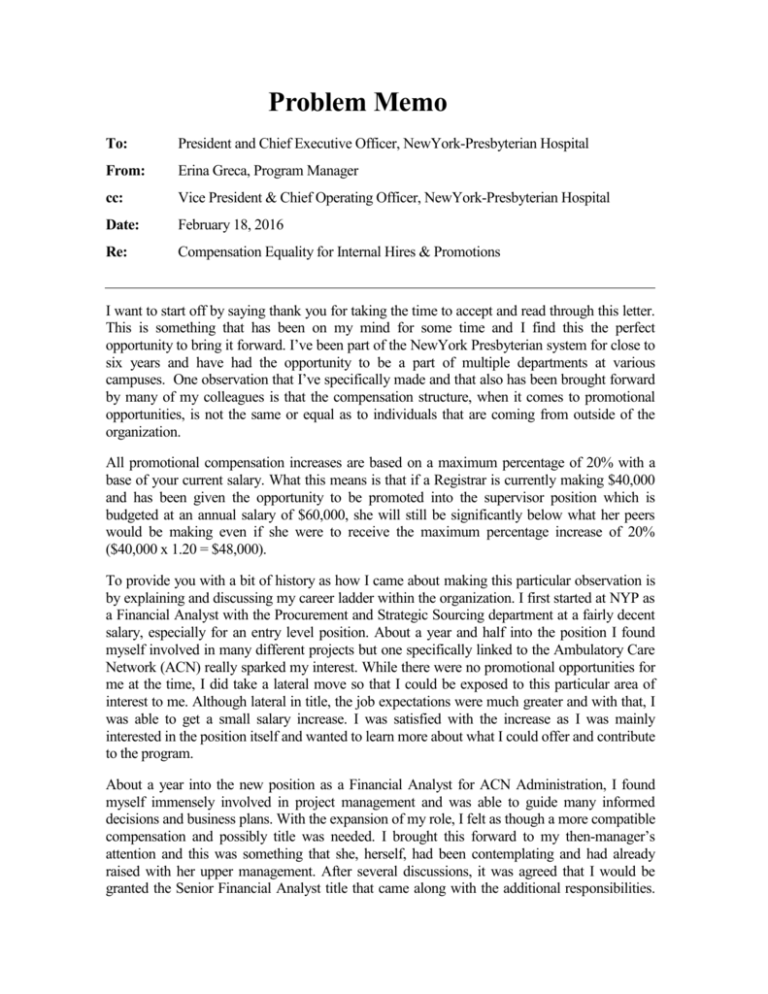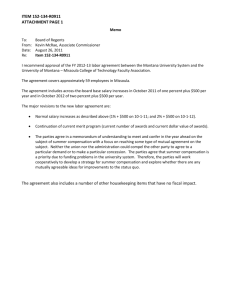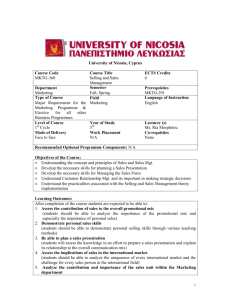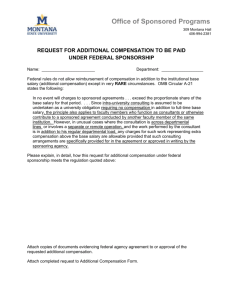Problem Memo - Blogs@Baruch
advertisement

Problem Memo To: President and Chief Executive Officer, NewYork-Presbyterian Hospital From: Erina Greca, Program Manager cc: Vice President & Chief Operating Officer, NewYork-Presbyterian Hospital Date: February 18, 2016 Re: Compensation Equality for Internal Hires & Promotions I want to start off by saying thank you for taking the time to accept and read through this letter. This is something that has been on my mind for some time and I find this the perfect opportunity to bring it forward. I’ve been part of the NewYork Presbyterian system for close to six years and have had the opportunity to be a part of multiple departments at various campuses. One observation that I’ve specifically made and that also has been brought forward by many of my colleagues is that the compensation structure, when it comes to promotional opportunities, is not the same or equal as to individuals that are coming from outside of the organization. All promotional compensation increases are based on a maximum percentage of 20% with a base of your current salary. What this means is that if a Registrar is currently making $40,000 and has been given the opportunity to be promoted into the supervisor position which is budgeted at an annual salary of $60,000, she will still be significantly below what her peers would be making even if she were to receive the maximum percentage increase of 20% ($40,000 x 1.20 = $48,000). To provide you with a bit of history as how I came about making this particular observation is by explaining and discussing my career ladder within the organization. I first started at NYP as a Financial Analyst with the Procurement and Strategic Sourcing department at a fairly decent salary, especially for an entry level position. About a year and half into the position I found myself involved in many different projects but one specifically linked to the Ambulatory Care Network (ACN) really sparked my interest. While there were no promotional opportunities for me at the time, I did take a lateral move so that I could be exposed to this particular area of interest to me. Although lateral in title, the job expectations were much greater and with that, I was able to get a small salary increase. I was satisfied with the increase as I was mainly interested in the position itself and wanted to learn more about what I could offer and contribute to the program. About a year into the new position as a Financial Analyst for ACN Administration, I found myself immensely involved in project management and was able to guide many informed decisions and business plans. With the expansion of my role, I felt as though a more compatible compensation and possibly title was needed. I brought this forward to my then-manager’s attention and this was something that she, herself, had been contemplating and had already raised with her upper management. After several discussions, it was agreed that I would be granted the Senior Financial Analyst title that came along with the additional responsibilities. This is where I started to make my initial observations in terms of the discrepancies when it came to compensation increase(s) for promotional opportunities. Although I was given a percentage increase that was closer to the maximum amount, when calculations were completed and all was laid in paper, I was able to identify that the salary was not in range with my expectations. I decided to do some research and found that on average, I was about 15-20% below what my peers were making in similar roles. I did bring my concerns forward to my manager and while she was able to communicate this out to the compensation department, she was told that the maximum increase for a promotional opportunity is twenty percent. Although a bit discouraged, I felt that I had the potential to keep learning and growing with the organization and decided to move forward with the original proposal. Shortly thereafter, I was approached by a Director that I had previously worked with in regards to an opportunity in his department as a Program Manager for an ED-based Patient Navigator Program. I was definitely intrigued by the idea and since I was fully aware of the missions and goals of the program, I decided to go through the application process. After several interviews, I was formally offered the position and was thrilled to be given the opportunity to showcase and polish my managerial skills. However, I must say that I was quite disappointed when it came to the compensation discussion. As with the other promotional opportunities I had taken on, the salary increase was once again to fall within the range of 8% to 20%. At the time, based on some calculations by the compensation department, I was given a total of a 12% increase which based on my base salary, was definitely not in line with what other managers were making. While compensation was not the main driver as to why I wanted to pursue this role; I did want to be fairly and equally compensated for my services, responsibilities and output. I did, however, accept the position as offered and this is where I currently “reside”. A later observation that came about as part of being a manager to over 20 employees was that when it came to hiring for an open position, there is a set budget. We cannot go over that budget but can certainly offer under. In one particular example that I faced a few months ago was when I was hiring for an additional supervisor for our program. My set budget was $60,000 and my immediate reaction was that the other supervisor, that was promoted into the position internally and was going to be this person’s counterpart but with much more experience, was making far less than what we would be hiring an externally candidate for. This, to me, was certainly unfair and created a lot of uneasiness. I did ultimately offer the position to an external candidate and opted for the max simply because he negotiated this with recruitment and had the experience that we needed. In other recent observations, I have noticed that several individuals that once left the organization have come back to NYP in different titles and roles but with a much more compatible compensation packages. I’ve had the opportunity to ask several of these employees as to why they made the decision to leave and come back and the major themes seem to be in regards to the compensation constraints when it came to promotional opportunities. They certainly enjoyed working with and identifying themselves with the organization but felt that they were best and fairly compensated only when they applied to these opportunities as external candidates. This meant that they had to leave for a given period of time and come back as “new”. This is extremely concerning to me. Why is it that we are losing good individuals that bring lots of value to our organization and programs simply because we cannot compensate them equal to what we could offer external employees? If we have a set budget, why do we have to limit 2 ourselves to these percentage increases even when we know that the employee deserves more and we do have the ability to offer more? Should we not be compensating individuals that we know do good work rather than bringing external candidates and not knowing how they will perform? How can we keep employees engaged if they feel they are not being equally compensated to their peers? Despite so many innovative employee perks and work life initiatives, it continues to be essential that employees feel they are paid fairly for the work they perform. That’s not to suggest that nonmonetary factors don’t contribute significantly to job satisfaction. They absolutely doi. Things that the organization has implemented, such as the “Everyday Amazing” platform where other employees and managers can recognize great work and award nominations for different individuals and teams, have definitely helped in making people feel valued while enhancing employee engagement. However, at the end of the day, money still matters. In the absence of everything else, it remains crucial that companies offer competitive compensation if they hope to retain top talent. Thank you for your time and attention. Look forward to hearing from you with comments, questions and/or potential suggestions. i Volume 32: Engaging Employees with Compelling Compensation Strategies. G&A Partners. Retrieved from http://www.gnapartners.com/spotlights/engaging-employees-compelling-compensation-strategies 3





